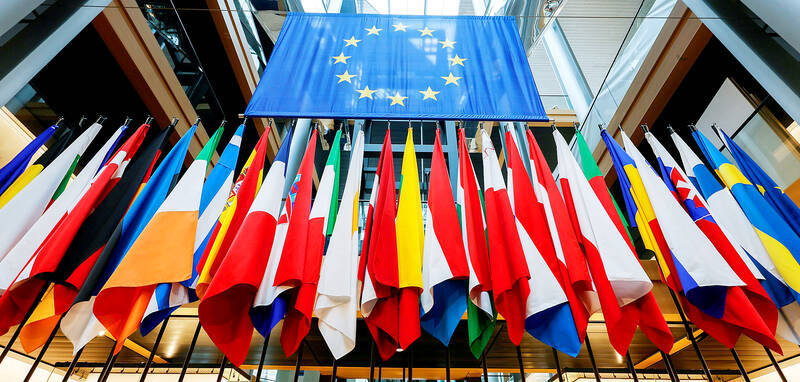EU institutions should “urgently draw up a scenario-based strategy” to tackle Taiwan’s security challenges, the European Parliament said on Wednesday as it adopted the implementation reports on two major EU security policies.
The parliament adopted the annual report on the implementation of the Common Security and Defense Policy with 459 “yes” votes, 93 “no” votes and 85 abstentions, and the implementation report on the Common Foreign and Security Policy with 407 “yes” votes, 92 “no” votes and 142 abstentions.
In its resolution on the defense policy report, the parliament said China had been using its military power to intimidate and threaten its neighbors, referring to China’s military drills around Taiwan in August last year following then-US House of Representatives speaker Nancy Pelosi’s visit to Taipei.

Photo: REUTERS
The resolution said that China’s “dangerous military actions and provocations continue to occur on a daily basis.”
The parliament expressed grave concern about China’s military buildup in the South China Sea, its incursions into Taiwan’s air defense identification zone, and its disinformation campaign and cyberattacks against Taiwan.
It called on China to stop these actions, saying they threaten the stability of the Indo-Pacific region, and directly affect European prosperity and security.
In the resolution on the foreign policy report, the parliament said it “strongly condemns” China’s continued military provocations against Taiwan, reiterating its firm rejection of any unilateral change to the “status quo” in the Taiwan Strait against the will of Taiwanese.
It expressed concern about Chinese President Xi Jinping’s (習近平) announcement at the Chinese Communist Party’s 20th National Congress last year that Beijing would not renounce the use of force against Taiwan.
It said Taiwan is a key partner of the EU that shares the bloc’s values, and called for greater cooperation on trade — including signing bilateral investment agreements — as well as customs inspections, diversifying and bolstering supply chains, and combating disinformation.
It encouraged exchanges between Taiwan and the EU “at the most senior levels possible” in culture, science, language education and the media, while reiterating its support for Taiwan’s meaningful participation in international bodies and organizations.
In Taipei, the Ministry of Foreign Affairs yesterday thanked the parliament for its support, adding that it has over the past two years passed 25 Taiwan-friendly resolutions.
Wednesday’s resolutions demonstrate its strong support of Taiwan and the stability across the Taiwan Strait, Deputy Director-General of European Affairs Lu Shih-fan (呂世凡) said.
The resolutions echo the report on EU-Taiwan Political Relations and Cooperation, which the parliament passed on Oct. 21, 2021, and support efforts to deepen Taiwan-EU ties, he added.
Lu said the government would continue to promote interactions and exchanges with the EU while pursuing peace and stability across the Strait.
Additional reporting by Lu Yi-hsuan

Right-wing political scientist Laura Fernandez on Sunday won Costa Rica’s presidential election by a landslide, after promising to crack down on rising violence linked to the cocaine trade. Fernandez’s nearest rival, economist Alvaro Ramos, conceded defeat as results showed the ruling party far exceeding the threshold of 40 percent needed to avoid a runoff. With 94 percent of polling stations counted, the political heir of outgoing Costa Rican President Rodrigo Chaves had captured 48.3 percent of the vote compared with Ramos’ 33.4 percent, the Supreme Electoral Tribunal said. As soon as the first results were announced, members of Fernandez’s Sovereign People’s Party

EMERGING FIELDS: The Chinese president said that the two countries would explore cooperation in green technology, the digital economy and artificial intelligence Chinese President Xi Jinping (習近平) yesterday called for an “equal and orderly multipolar world” in the face of “unilateral bullying,” in an apparent jab at the US. Xi was speaking during talks in Beijing with Uruguayan President Yamandu Orsi, the first South American leader to visit China since US special forces captured then-Venezuelan president Nicolas Maduro last month — an operation that Beijing condemned as a violation of sovereignty. Orsi follows a slew of leaders to have visited China seeking to boost ties with the world’s second-largest economy to hedge against US President Donald Trump’s increasingly unpredictable administration. “The international situation is fraught

MORE RESPONSIBILITY: Draftees would be expected to fight alongside professional soldiers, likely requiring the transformation of some training brigades into combat units The armed forces are to start incorporating new conscripts into combined arms brigades this year to enhance combat readiness, the Executive Yuan’s latest policy report said. The new policy would affect Taiwanese men entering the military for their compulsory service, which was extended to one year under reforms by then-president Tsai Ing-wen (蔡英文) in 2022. The conscripts would be trained to operate machine guns, uncrewed aerial vehicles, anti-tank guided missile launchers and Stinger air defense systems, the report said, adding that the basic training would be lengthened to eight weeks. After basic training, conscripts would be sorted into infantry battalions that would take

GROWING AMBITIONS: The scale and tempo of the operations show that the Strait has become the core theater for China to expand its security interests, the report said Chinese military aircraft incursions around Taiwan have surged nearly 15-fold over the past five years, according to a report released yesterday by the Democratic Progressive Party’s (DPP) Department of China Affairs. Sorties in the Taiwan Strait were previously irregular, totaling 380 in 2020, but have since evolved into routine operations, the report showed. “This demonstrates that the Taiwan Strait has become both the starting point and testing ground for Beijing’s expansionist ambitions,” it said. Driven by military expansionism, China is systematically pursuing actions aimed at altering the regional “status quo,” the department said, adding that Taiwan represents the most critical link in China’s